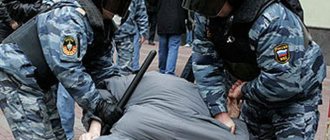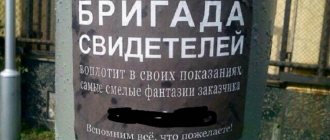Liability for knowingly false reporting of an act of terrorism
In the system of crimes against public safety, such an act as “a knowingly false report of an act of terrorism, an impending explosion, arson or other actions that create a danger of death, causing significant property damage or other socially dangerous consequences” is one of the most serious.
As a result of such actions, serious material damage is caused to citizens in particular and the state as a whole, since law enforcement officers, fire service officers, and emergency medical services immediately respond to a false call, and the work schedules of various institutions and enterprises are disrupted. In connection with such messages, the departure of “alarm” groups, as well as the evacuation of citizens, must be carried out without fail, which leads to people feeling fear, defenselessness and discomfort in the current situation. Law enforcement agencies always act on the premise of the existence of a real danger, therefore, all threats of this kind received are checked, urgent measures are taken to search for explosive devices and prevent possible negative consequences. As a consequence, this leads to the forced diversion of forces and resources to prevent an imaginary threat to the detriment of solving problems of ensuring public safety.
Knowingly false reporting of an act of terrorism is subject to criminal liability in accordance with Article 207 of the Criminal Code of the Russian Federation.
Knowingly false information about an impending explosion, arson or other actions that create a danger of death of people, causing significant property damage or other socially dangerous consequences is punishable by a fine in the amount of up to two hundred thousand rubles or in the amount of the wages or other income of the convicted person for a period of up to eighteen months. , or compulsory labor for a term of up to four hundred eighty hours, or correctional labor for a term of one to two years, or restriction of freedom for a term of up to three years, or forced labor for a term of up to three years, or arrest for a term of three to six months , or imprisonment for a term of up to three years.
The same act, which entailed the infliction of large damage or the onset of other grave consequences, is punishable by a fine in the amount of up to one million rubles or in the amount of the wages or other income of the convicted person for a period of eighteen months to three years, or by imprisonment for a term of up to five years. In this article, major damage is defined as damage the amount of which exceeds one million rubles.
Moreover, if the person who falsely reported an act of terrorism has not reached the age of 18 and cannot fully exercise his right to defense, in accordance with Article 48 of the Criminal Procedure Code of the Russian Federation, parents are allowed as legal representatives of a minor suspect.
Criminal actions violate the interests of the Russian Federation and the subject of the Russian Federation, since services that carry out emergency visits (using equipment, facilities, employees, etc.) are financed from the budgets of the Russian Federation and the subject of the Russian Federation.
Protection of rights by virtue of Article 12 of the Civil Code of the Russian Federation is possible through compensation for losses.
Thus, in addition to criminal liability, persons who falsely report an act of terrorism may be charged, including at the request of the prosecutor, all expenses associated with the work of emergency services in connection with a knowingly false report of an act of terrorism.
Difference between criminal and administrative liability
The document also clarifies that fakes about the situation with the new coronavirus infection become a criminal offense if they create a real public danger.
Explaining the difference between criminal and administrative liability for the dissemination of knowingly false information about coronavirus in the media or on the Internet under the guise of reliable information, the Supreme Court explained that the actions of an individual can be qualified under Article 207.1 of the Criminal Code of the Russian Federation in cases where the dissemination of such knowingly false information is about the circumstances the spread of a new infection, measures taken to ensure the safety of the population and territories, methods and methods of protection - taking into account the conditions in which it is carried out, the purpose and motives of the actions taken (for example, in order to provoke panic among the population, to disrupt law and order), represents a real public danger and causes harm to relations protected by criminal law in the field of ensuring public safety.”
The public nature of the dissemination of deliberately false information “can be manifested not only in the use of the media and information and telecommunication networks for this, but also by speaking at a meeting, rally, distributing leaflets, hanging posters, etc.,” the Supreme Court explained.
The difference in the application of administrative liability under Parts 10.1 and 10.2 of Art. 13.15 of the Code of Administrative Offenses of the Russian Federation and criminal liability under Art. Art. 207.1 and 207.2 of the Criminal Code of the Russian Federation lies in the person held accountable: administrative liability is established only for legal entities, and citizens, including officials and managers of a legal entity, can be held criminally liable. At the same time, criminal prosecution for fakes can only be carried out for acts committed after April 1, 2021 - after the law introducing articles on the spread of fakes in the Criminal Code came into force. “At the same time, a mandatory condition for liability under Article 207.2 of the Criminal Code of the Russian Federation is the occurrence of socially dangerous consequences consisting of a causal connection with such actions,” the review emphasizes.
The acquittal
Article 207 of the Criminal Code of the Russian Federation does not consider cases in which:
- the person had fictitious information about the preparation of a terrorist act;
- the person did not have the intention to provide knowingly false information, because it was misled by another person.
In all of the above cases, a person is not liable in accordance with Article 207 of the Criminal Code of the Russian Federation, since this does not apply to knowingly false information.
Accordingly, if the person who committed the crime was misled, he will not be held accountable.
Reminder on knowingly false reports of an act of terrorism
Before sending the message in question to law enforcement agencies, read this memo. It will help you understand the real cost of the act being performed.
- Know that by making a bad joke like this, or sending a message about a terrorist attack, you are committing a number of crimes such as:
- attack on public safety;
- disruption of the normal activities of government agencies;
- wasting a significant amount of money and power resources of government agencies;
- causing harm to the interests and health of specific citizens.
2. Everything that is said by the informant or done in order to create the appearance of a planned terrorist attack constitutes a crime characterized as criminally punishable. The measures of responsibility applied to criminals in this case will be indicated by the Criminal Code of our country, namely, its Article No. 207.
- The motive of your action in the case of transmitting a false message about terrorism does not matter. It can be dictated:
- hooligan intentions;
- the desire to evaluate the performance characteristics of government bodies;
- the desire to achieve a useful personal goal, for which it is necessary to disrupt the work order for any organizations.
Often such jokes are spread by schoolchildren who will not bear responsibility for the act. In this case, their parents are responsible for everything
Remember, responsibility for committing the designated unlawful act begins at the age of 14; accordingly, even childhood will not be an argument for the court for refusing to impose a punishment commensurate with the act.
Cases of an offense
There are many examples in judicial practice when false denunciations about an impending terrorist act led to serious consequences:
- In 1995, in Rostov-on-Don, a man contacted the FSK department. He said that he would turn off two mines with which he plans to blow up a regular bus if he is paid 200 thousand rubles. As a result of illegal actions, the man was detained and faced a sentence of 4 years in prison. The motive in this case turned out to be a banal lack of material resources, and all activities were based on the desire to earn money. At the same time, more than 7 million rubles were spent on activities to search and detect explosives.
- In 1996, a man called a Voronezh hospital and reported explosives in the building. More than 100 patients were evacuated, including patients who were in serious condition. As a result, one person died and important operations were suspended.
- In the same 1996, the administration of Vnukovo-1 airport received a call reporting a bomb threat. Everyone inside the airport building was evacuated and flights were delayed.
Any case where there was a false report of an impending act of terrorism was accompanied by losses of various kinds.
In some cases, these losses were material, and in others, false denunciations led to the death of people. Therefore, it is difficult to disagree with the fact that this crime is quite dangerous for modern society.
Amendments to the Criminal Code
On April 1, Russian President Vladimir Putin approved amendments to the Criminal Code of the Russian Federation on imprisonment for up to five years for the dissemination of deliberately false information by citizens, which led to grave consequences. The corresponding law was adopted by the State Duma and approved by the Federation Council at an extraordinary plenary meeting.
According to these changes to the legislation, for the public dissemination of deliberately false socially significant information under the guise of reliable messages, which through negligence resulted in harm to human health, a penalty is introduced in the form of a fine in the amount of 700 thousand to 1.5 million rubles or in the amount of income for the period up to 18 months or in the form of correctional labor for up to a year, forced labor or imprisonment for up to three years.
If the spread of fakes has led, through negligence, to the death of a person or other grave consequences, we will be talking about a fine in the amount of up to 2 million rubles or in the amount of the convicted person’s income for a period of up to three years, correctional labor for up to two years, forced labor or imprisonment for up to five years.
Who and why is terrorizing Russians with false calls about mining crowded places?
Every day there are reports from all over Russia about emergency evacuation - people are hastily leaving train stations, cinemas, shopping bombs, there are “mines”. When asked what is going on, no one answers. Deliberate panic-mongering? Unannounced large-scale exercises? Or maybe just an incredible coincidence?
Plot: Wars of the 21st century
The Ministry of Emergency Situations claims that there are no exercises at the moment, the Ministry of Internal Affairs “does not know about the connection between the exercises and evacuations”, the FSB simply does not comment on the situation... No one is giving clear explanations for what is happening, and, in fact, the Russians are being hinted: in these circumstances it is better not panic and don't ask.
With things on the way out
The geography of emergency situations is indeed wide. In Ekaterinburg
Over the past 2-3 days, students of the Ural Medical University and UrFU were hastily removed from classes, the Greenwich shopping center and the Southern Bus Station were evacuated. Several more buildings are said to have passed inspection.
In Perm
Schools, the city administration, the department of land and property relations were evacuated... In total, more than 25 objects. The alarm had to be raised several times not only by the Ministry of Emergency Situations, but also by dog handlers, doctors, the Russian Guard, FSB officers and police officers.
In Ufa
anonymous well-wishers reported that the Bashkiria, Gostiny Dvor, Mega, and Central shopping centers were mined.
Another false call came from Sterlitamak
.
On September 12, the evacuation was carried out at the Moscow Peoples' Friendship University (RUDN University). As it turned out, this story does not fit into the general order: planned educational alarms at the university are held once a semester.
In Chelyabinsk
Police forces were also deployed to the shopping complexes “Rodnik”, “Almaz”, “Gorki”, “Focus”, “Fiesta”, “Koltso” due to a real, and not a planned alarm - there was a message about the threat of a terrorist attack.
Chelyabinsk security officials, by the way, as part of an unofficial comment, reported that there had been a planned telephone attack from abroad.
In Novosibirsk
(after an anonymous call about mining) at 2 o’clock in the morning the bus station and hotel were evacuated.”
Alarming messages coming from Krasnoyarsk
.
of Kemerovo
and
Chita
were evacuated .
In Yakutsk, Chita, Blagoveshchensk
Airports have been evacuated.
The mayor's office and several schools in Petropavlovsk-Kamchatsky
.
Abakan, Norilsk, Zelenogorsk, Ulan-Ude
... The most recent message at the time of publication came from Samara, where more than 20 buildings were evacuated. And it’s not a fact that everything is over.
The online map compiled by journalists from the site https://59.ru shows more than 20 hot spots
Regional administrations either do not comment or limit themselves to formulas like “the situation is under control” and “all necessary security measures have been taken in full.” While officials are keeping silent, social networks are full of back-and-forth. “The school is like this, the children are being sent home, the second shift has been cancelled... The shopping center has been evacuated... A cordon is being set up around the station...”
Fortunately, none of the dozens of reports of mining were confirmed. There is no mass hysteria and panic, people manage to control themselves, and emergency services manage to somehow cope with the flow of requests for help.
frameborder=”0″ allowfullscreen>
Stavropol became the record holders
(42 evacuated facilities) and
Omsk
(56 facilities, approximately 7 thousand people). At the same time, Omsk is perhaps the only city where it was openly announced that this was not about exercises. Enhanced security measures are associated with emerging information about possible terrorist attacks by ISIS*: security forces allegedly learned that a terrorist organization banned in the Russian Federation was preparing a series of terrorist attacks. Because of this, district heads and heads of executive authorities received a recommendation to “strengthen security measures.” The city administration, schools, and shopping centers were evacuated.
You need to understand...
Relative clarity is provided by a document posted on one of the pages of the VKontakte network: supposedly a copy of a message from the anti-terrorist commission of the Omsk region (of course, no one can confirm the authenticity of the scan). The letter, addressed to the heads of executive authorities and heads of municipal districts, states that the terrorist organization “Islamic State” is preparing a series of terrorist attacks in crowded places. The date on the document is September 8. Calls about mining started coming in starting on the 10th.
Photo from the “Omsk VK” group on the social network “VKontakte”
On the 11th, the Omsk City Hall confirmed to Interfax: “A call came in. We are evacuating people. This is not a drill"
.
Another day later, the media managed to get a comment from the main department of information policy of the Omsk region. According to the department, we are talking about upcoming anti-terrorism exercises. “You need to understand the conditions under which this document appeared.
The fact is that earlier exercises on anti-terrorism activities were planned, and before such exercises, government agencies are put on high alert. This document is dedicated to exactly this. The fact that all sorts of “mining” began in our country was, as they say, simply a coincidence ,” they say at the State Administration for Inspectorate. The exercises, according to them, have not yet begun.
So there is no basis for the assumption that anti-terrorism training is already underway – in real-life mode. Or?..
Right now
They took the situation quite seriously in Chelyabinsk: today, September 13, city mayor Evgeny Teftelev is holding an unscheduled meeting of the anti-terrorism commission there with the participation of heads of law enforcement agencies.
Similar events have been announced in Magnitogorsk and Kopeisk. * The Islamic State is recognized as a terrorist organization, whose activities in Russia are officially prohibited by the decision of the Supreme Court of the Russian Federation dated December 29, 2014. “Imarat Kavkaz” (“Caucasian Emirate”) is an international organization officially banned in Russia. The Islamic Party of Turkestan (formerly the Islamic Movement of Uzbekistan) is an international organization officially banned in Russia.
Commentary to Art. 207 of the Criminal Code of the Russian Federation
1. The danger of a crime lies in the fact that the activities of authorities are disorganized, panic is sowed among the population, law enforcement forces are diverted, funds are diverted to verify false reports, and material damage is caused.
According to paragraph “e” of Part 1 of Art. 1 of the Montreal Convention for the Suppression of Unlawful Acts against the Safety of Civil Aviation of September 23, 1971, any person commits an offense if he knowingly provides false information, thereby endangering the safety of an aircraft in flight. ——————————— See: Collection of current treaties, agreements and conventions concluded by the USSR with foreign states. Vol. XXIX. M., 1975. S. 90 - 95.
2. An additional object of this crime is property relations (material damage, consisting of the costs of law enforcement agencies to verify a report of an act of terrorism, lost profits of enterprises as a result of suspension of work), the rights and interests of citizens, the normal activities of organizations, institutions, enterprises where allegedly an act of terrorism will be committed. In some cases, harm to human health may occur, e.g. as a result of panic, crush, etc.
3. From the objective side, this crime is expressed in actions in the form of a knowingly false report only about an impending act of terrorism - an explosion, arson or other actions that create the danger of death of people, causing significant material damage or the occurrence of other dangerous consequences that characterize terrorism (Article 205 of the Criminal Code RF). A knowingly false report about an allegedly committed act of terrorism entails in certain cases liability for knowingly false denunciation (Article 306 of the Criminal Code of the Russian Federation).
4. A public knowingly false report about an impending terrorist act with the aim of defaming another person without counting on the response of the authorities to prevent it may entail liability for libel (Article 128.1 of the Criminal Code of the Russian Federation) or a knowingly false denunciation (Article 306 of the Criminal Code of the Russian Federation), and if counting on such a response - according to the totality of Art. 207 from Art. Art. 128.1 or 306 of the Criminal Code of the Russian Federation. If a knowingly false report about an impending act of terrorism is made with the aim of diverting the attention of the authorities from the actual impending act of terrorism, then the act is recognized as preparatory actions for an act of terrorism, covered by Art. 205 of the Criminal Code and additional qualifications under Art. 207 of the Criminal Code does not require it.
5. The commented article does not name the addressees of false messages, but these could be any authorities, local governments, officials of organizations, enterprises, citizens whose interests are affected and who are obliged or forced to respond to them. The form and method of transmitting a deliberately false message can be different - orally, in writing, using technical means of communication, in person, through other persons, etc. - and do not affect the qualification of the crime, it is enough that the person is confident that his false report will achieve its goal.
6. A formal crime is recognized as completed from the moment of receipt of knowingly false information by the addressee to whom the knowingly false message was transmitted, who is obliged to respond to the receipt of such information. If a deliberately false report about an act of terrorism contains information about persons allegedly preparing to commit it, then in this case there is an ideal set of crimes provided for in Art. 207 and part 2 of Art. 306 of the Criminal Code (deliberately false denunciation with qualifying circumstances).
7. The subjective side of this crime is characterized by direct intent. The person is aware that he is communicating false information about an impending explosion, arson, or other actions that create danger, and that this message may cause panic, fear, anxiety, or violate public safety, and wishes to act in this way. A mandatory element of a crime is knowledge of a false report. The motive for a crime can be different, for example. hooliganism, revenge, personal interests, etc., does not affect qualifications. If a person is mistaken in good faith and believes that his information about an impending act of terrorism corresponds to reality, then liability is excluded. For example, a person saw an object left in a vehicle, which he perceived by its appearance as an explosive device, and reported this to law enforcement agencies, but after a check, the discovered object did not turn out to be such a device.
8. The subject of the crime is a sane individual who has reached the age of 14.
9. Part 2 of the commented article provides for the qualified elements of a knowingly false report about an act of terrorism - the same act that entailed causing major damage or the onset of other grave consequences. In note To the commented article, the concept of major damage is given, which recognizes damage exceeding the amount of 1 million rubles. Other serious consequences should be understood as causing minor or moderate harm to human health, disruption of the work of an organization, enterprise, institution, public transport, associated with a long cessation of work, etc.







